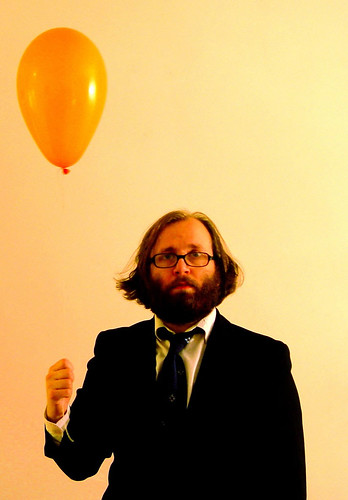
I always enjoy a bit of Charlie. This is perhaps less to do with his level of insight than the simple fact that I want his job. For what could be more fulfilling than trawling through endless clips of trashy TV and making snide remarks about it all? Perhaps I admire the format more than the presenter. His schoolboy-ish delivery and his predilection for wanking jokes, though enjoyable, are somewhat inappropriate for BBC4. He endears himself to his audience by coupling an air superiority with extreme self-loathing. How very British of him. I am afraid his charms are often lost on me.
The appeal of the show is in its analysis. For example, Brooker's dissection of the political-correctness-gone-mad fist-wringing moan-fest that was Noel's HQ, presented by the mental Noel Edmonds, struck a particularly tuneful chord. Dodgy TV clairvoyant Derek Acorah's Michael Jackson Seance was also a high point. Who knew such programmes even existed? Half the fun of Screenwipe is the ability of Brooker (or Brooker's research team) to unearth hilariously awful programmes that have surreptitiously made their way into the TV schedule. The vitriolic rants on how poor quality television is a manifestation of a society in decline are often unnecessary, since we, the audience, do not need to be reminded how terrible these programmes are. They speak for themselves. The writing in Screenwipe is witty and engaging, so hats off to Charlie for that, but perhaps he could do with drafting in a professional presenter.
I am not an avid follower of Brooker's other work but I do occasionally dabble. There have been five series of Screenwipe (to my knowledge), which has given him ample scope to discuss every area of television imaginable. Some of the best bits include Series 5 Episode 3 where Brooker spends the entire episode interviewing TV writers whom he admires (including the lovely Jesse Armstrong and Sam Bain of Peep Show fame), his analysis on childhood obesity in relation to class and his expose on the horrors of American TV. At this point, I should reveal that I learnt most of what I know about the broadcasting industry from Charlie. Screenwipe is infotainment at its best.
In a similar vein, Brooker also wrote and presented Gameswipe (interesting but mainly aimed at computer game fans) and Newswipe (absolutely mind blowing). Newswipe has much smaller target of critique than Screenwipe (i.e. the television news media rather than the entire of humanity) and therefore works better. Every episode is more enlightening than the last, ridiculing the all-singing all-dancing interactive reality TV game show that the news has become. I can particularly recommend the episode about America's right-wing media. Charlie also writes a column for The Guardian which, though I don't read it every week, seems to be a bit patchy. Sometimes it is a joy to read, sometimes it is simply a page of venomous venting and occasionally it is incoherent, clearly having been thrown together an hour before the deadline.
His occasional journalistic slip-ups do not undermine his overall talent. Brooker manages to present not only the follies but also the joys of telly, putting paid to the view that television is an instrument of evil, corrupting our children and killing our brain cells. Afterall, television has given us such delights as the hard-hitting drama The Wire, landmark documentarist Adam Curtis, and life-shaping kids programmes (see Stewart Lee's take on this - watch from 5:30 minutes.) Ultimately, Charlie fuels the fire of my most shameful vice - watching shows on telly on telly - without making me feel geeky.
